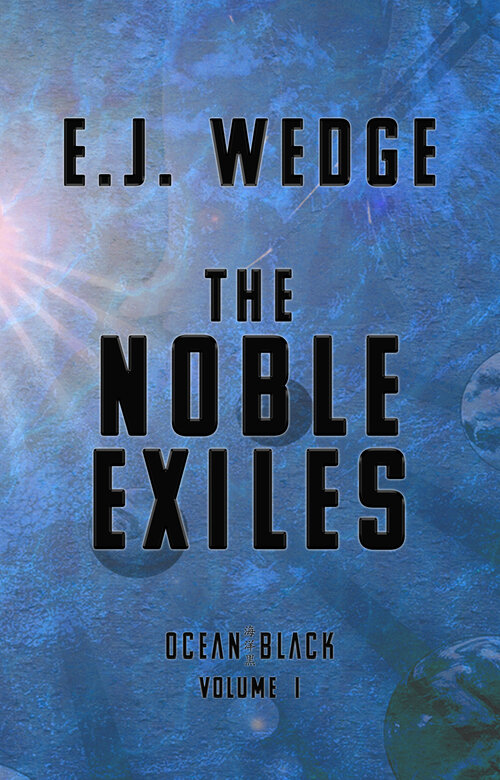
Author E.J. Wedge plunges readers into the dark and unknown ocean of the future with his first novel, The Noble Exiles, the first installment of the Ocean Black series, a sprawling and visionary sci-fi debut.
Unknown centuries in the future, with Earth long ago abandoned, the scattered seeds of humanity have spread to dozens of other stars and planets across the galaxy. However, the details of how the interstellar Nation was finally united, and how the Forging War saved our species, may not be the true origin story of cosmic peace.
The tale is told largely from the perspective of Melinda, the granddaughter of the legendary “saviors” of humanity, Sonny Aemrose and Able DuVanqueth. She’s a child prodigy, with a sharply critical eye towards historical accounts, and the novel tells the real story of how her family came to impact the fate of the cosmos, and how complex the journey towards peace truly was.
Resembling an intimate journal, scathing exposé, future-history book, sci-fi thriller, and character-driven family drama, the prose cleverly relies on unreliable narrators, and even conflicting accounts, forcing readers to consider the nature of truth, victory, and the intentions of those who write the history books. From space-Viking terrorist madmen to medieval knights bearing future-tech weapons, there are few stylistic lines that can’t be flirted with or crossed in this broad-spectrum future.
The most fascinating part of this premise is the diversity of worlds that humanity’s fragmented descendants have built for themselves, the underlying themes play on the unity of shared experience and fundamental need. As so many great sci-fi novels do, this book offers a word of warning to the leaders and drivers of modern society, as we consider the future, and recklessly speed towards it. Early on, Melinda presents a timeless piece of wisdom: doing things because you can is not the same as doing something because you should, and this point underpins many of the book’s basic themes.
The formatting is unique and flexible, incorporating maps and diagrams, portraits and artist’s representations, tables and charts, as well as itemized points from Melinda’s memory and script-like exchanges of imagined dialogue. As a whole, this adds a level of authenticity and solidity to the storyline – it is far easier to believe in a world when it’s backed up with so much research, fictional as it may be. The level of detail and world-building that has gone into this literary creation is immense; populating one imagined world with culture and compelling characters is hard enough, but Wedge crafts multiple interlinked histories as a foundation for this series. There is an occasional slip of anachronistic language, and some slower passages of exposition, but the text is neatly edited, and an abundance of care went into every page.
Pulling readers through accounts of fallen kingdoms, vanquished kaisers, collapsing planets, and titanic military alliances, the best word to describe Melinda’s confessional is ‘epic’ on every scale imaginable. For a first novel, this is a darkly ambitious plunge into the future, unlike any other cosmic colonization saga on the shelves, making it an extraordinarily exciting start to Wedge’s Ocean Black series.
Book Links
STAR RATING
Design
Content
Editing
Get an Editorial Review | Get Amazon Sales & Reviews | Get Edited | Get Beta Readers | Enter the SPR Book Awards | Other Marketing Services























Leave A Comment